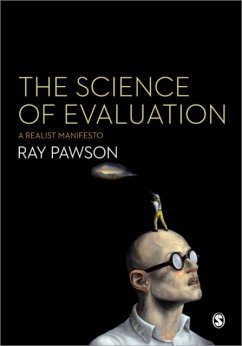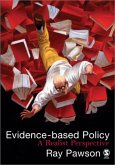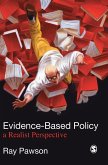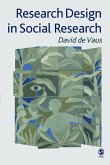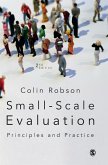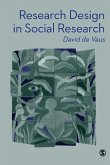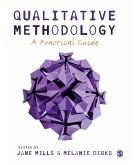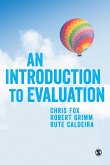Evaluation researchers are tasked with providing the evidence to guide programme building and to assess its outcomes. As such, they labour under the highest expectations - bringing independence and objectivity to policy making. They face huge challenges, given the complexity of modern interventions and the politicised backdrop to all of their investigations. They have responded with a huge portfolio of research techniques and, through their professional associations, have set up schemes to establish standards for evaluative inquiry and to accredit evaluation practitioners. A big question remains. Has this monumental effort produced a progressive, cumulative and authoritative body of knowledge that we might think of as evaluation science? This is the question addressed by Ray Pawson in this sequel to Realistic Evaluation and Evidence-based Policy. In answer, he provides a detailed blueprint for an evaluation science based on realist principles.
This work provides a real breakthrough. It teaches us to appreciate the hugely varied interactions that can occur when our policy interventions are inserted into the complex environments in which we live. More importantly, it teaches us how to extract general lessons from the diverse occurrences we observe in various policy settings, so that we can have a better understanding and better results in the future.
Nancy Cartwright
Professor of Philosophy, University of California San Diego
Pawson has lost none of his touch for the pithy phrase and no-nonsense argument, but this time the style is put to service in a work of architectural proportions. I hope and expect this book to become required reading within and beyond the evaluation community.
Christopher Pollitt
Emeritus Professor, Katholieke Universiteit Leuven, Belgium
Ray Pawson's new book is a treat for evaluators, particularly in a world full of checklists, protocols, guidelines, and best practices. Evaluation is back to where it belongs: a full consideration of the theory and method of applied research with its scientific roots taken seriously.
Frans Leeuw
Professor of Law, Public Administration and Social Research, Maastricht University, The Netherlands
Like his earlier books, Realistic Evaluation, with Nick Tilley, and Evidence-Based Policy: A Realist Approach, this book has the potential to transform our understanding of what evaluation can be and how it can be used. Pawson addresses common questions about realist evaluation and shows clearly that it is more than simply identifying patterns in results but essentially involves iteratively building and testing theories to explain these patterns. His revisiting of classic evaluation texts demonstrates their realist underpinnings and he convincingly reclaims the Campbell mantle from those who would invoke his name only for a narrow range of experimental research designs. The book deserves an audience among evaluators and users of evaluation, especially those who are sceptical of realist evaluation who can create the "mutually monitoring, disputatious community of scholars" to properly review and revise these ideas.
Patricia Rogers
Professor of Public Sector Evaluation, Royal Melbourne Institute of Technology, Australia
I really enjoyed the evident relish which Ray Pawson takes into methodological debates, and the disputatious but constructive style of the whole book - a good example being the section on the MRC complex interventions evaluation framework. One particular highlight in the book for me was the chapter on 'clinical interventions as social interventions' which should be required reading for all biomedicalinical researchers, if only because they'll disagree with it.
Kieran Walshe
Professor of Health Policy and Management, Manchester Business School
Ray Pawson's The Science of Evaluation completes the realist evaluation trilogy composed of Realist Evaluation (co-author NickTilley) and Evidence-based Policy. His approach has beguiled many in the field but has left us with many puzzles: How to deal with complex programs? How to choose and develop program theories? How to deal with uncertainty? This new work provides answers, with characteristic brio, by moving backwards into the theoretical roots of realism, with its generative view of causation, and the legacy of the evolutionary epistemology - and also by moving forward presenting illustrations of the logic of inquiry of evaluations that provide a "realist response to complexity". Pawson's argument for "middle range theories" and "partial knowledge" is an invitation to engage in a "never-ending journey" that will take evaluation to the core of policy-making and social change.
Prof Nicoletta Stame
Sapienza: Università di Roma
Ray Pawson is quite a rare creature - a professor of social research methodology, and this is a book about methodology, the 'how to' of the evaluation of public policies and programmes. It both argues for a 'realist' approach to these activities and explores in some detail what such an approach entails. It is written in a lively, vivid, personal and often humorous way that will be familiar to those who read the author's previous works...I would say that, whether or not you intend to embark on this particular voyage, whether or not you like academic texts which are sprinkled with humour, you should consider reading this book. It strikes me as genuinely important, and very challenging. And certainly all those who think they believe in (or at least believe it is judicious to pretend to believe in) 'evidence-based policymaking' should explore Pawson's book - in order to get a taste for just what that would actually entail.
Christopher Pollitt
The International Review of Administrative Sciences
Nancy Cartwright
Professor of Philosophy, University of California San Diego
Pawson has lost none of his touch for the pithy phrase and no-nonsense argument, but this time the style is put to service in a work of architectural proportions. I hope and expect this book to become required reading within and beyond the evaluation community.
Christopher Pollitt
Emeritus Professor, Katholieke Universiteit Leuven, Belgium
Ray Pawson's new book is a treat for evaluators, particularly in a world full of checklists, protocols, guidelines, and best practices. Evaluation is back to where it belongs: a full consideration of the theory and method of applied research with its scientific roots taken seriously.
Frans Leeuw
Professor of Law, Public Administration and Social Research, Maastricht University, The Netherlands
Like his earlier books, Realistic Evaluation, with Nick Tilley, and Evidence-Based Policy: A Realist Approach, this book has the potential to transform our understanding of what evaluation can be and how it can be used. Pawson addresses common questions about realist evaluation and shows clearly that it is more than simply identifying patterns in results but essentially involves iteratively building and testing theories to explain these patterns. His revisiting of classic evaluation texts demonstrates their realist underpinnings and he convincingly reclaims the Campbell mantle from those who would invoke his name only for a narrow range of experimental research designs. The book deserves an audience among evaluators and users of evaluation, especially those who are sceptical of realist evaluation who can create the "mutually monitoring, disputatious community of scholars" to properly review and revise these ideas.
Patricia Rogers
Professor of Public Sector Evaluation, Royal Melbourne Institute of Technology, Australia
I really enjoyed the evident relish which Ray Pawson takes into methodological debates, and the disputatious but constructive style of the whole book - a good example being the section on the MRC complex interventions evaluation framework. One particular highlight in the book for me was the chapter on 'clinical interventions as social interventions' which should be required reading for all biomedicalinical researchers, if only because they'll disagree with it.
Kieran Walshe
Professor of Health Policy and Management, Manchester Business School
Ray Pawson's The Science of Evaluation completes the realist evaluation trilogy composed of Realist Evaluation (co-author NickTilley) and Evidence-based Policy. His approach has beguiled many in the field but has left us with many puzzles: How to deal with complex programs? How to choose and develop program theories? How to deal with uncertainty? This new work provides answers, with characteristic brio, by moving backwards into the theoretical roots of realism, with its generative view of causation, and the legacy of the evolutionary epistemology - and also by moving forward presenting illustrations of the logic of inquiry of evaluations that provide a "realist response to complexity". Pawson's argument for "middle range theories" and "partial knowledge" is an invitation to engage in a "never-ending journey" that will take evaluation to the core of policy-making and social change.
Prof Nicoletta Stame
Sapienza: Università di Roma
Ray Pawson is quite a rare creature - a professor of social research methodology, and this is a book about methodology, the 'how to' of the evaluation of public policies and programmes. It both argues for a 'realist' approach to these activities and explores in some detail what such an approach entails. It is written in a lively, vivid, personal and often humorous way that will be familiar to those who read the author's previous works...I would say that, whether or not you intend to embark on this particular voyage, whether or not you like academic texts which are sprinkled with humour, you should consider reading this book. It strikes me as genuinely important, and very challenging. And certainly all those who think they believe in (or at least believe it is judicious to pretend to believe in) 'evidence-based policymaking' should explore Pawson's book - in order to get a taste for just what that would actually entail.
Christopher Pollitt
The International Review of Administrative Sciences

